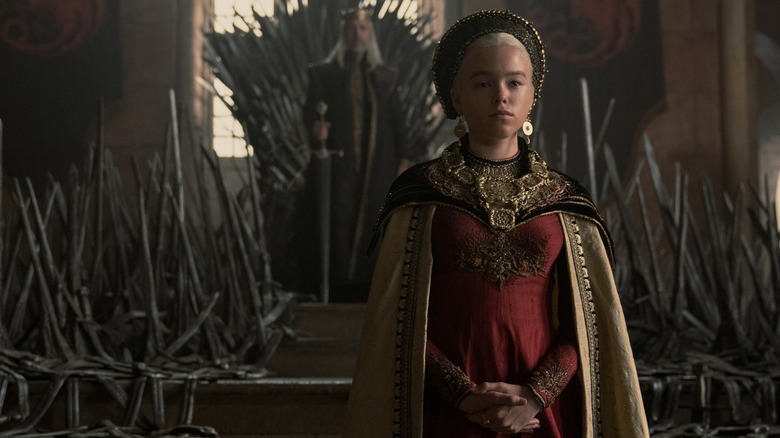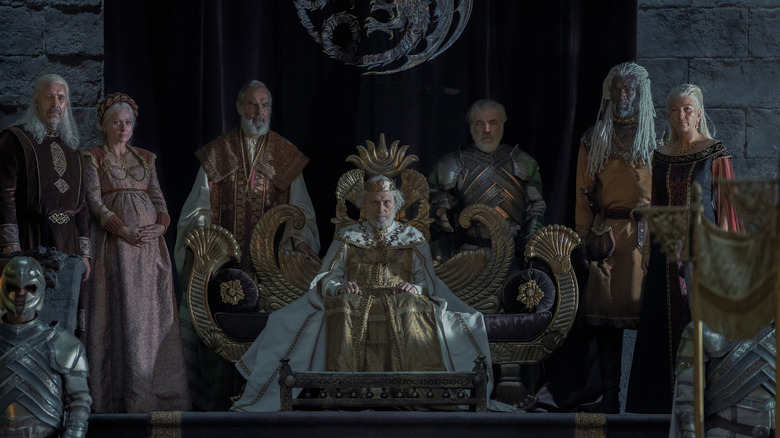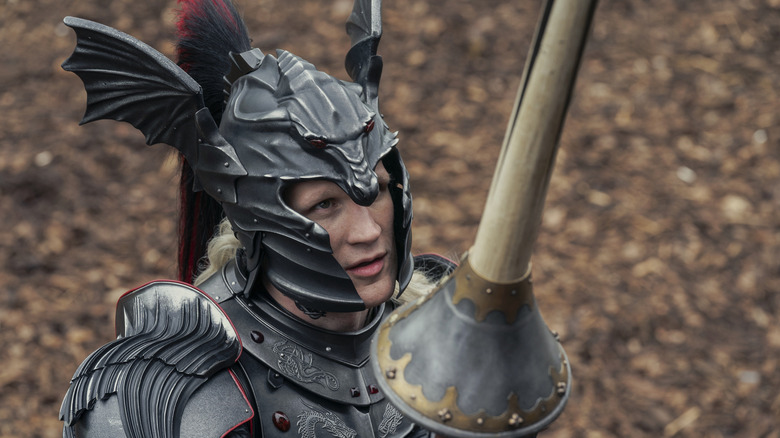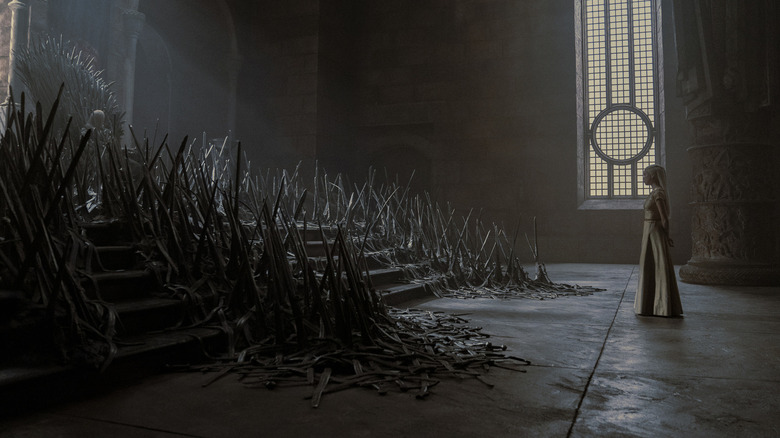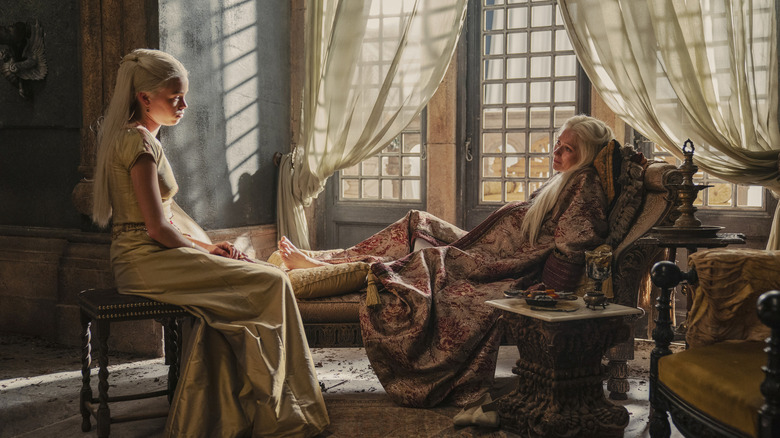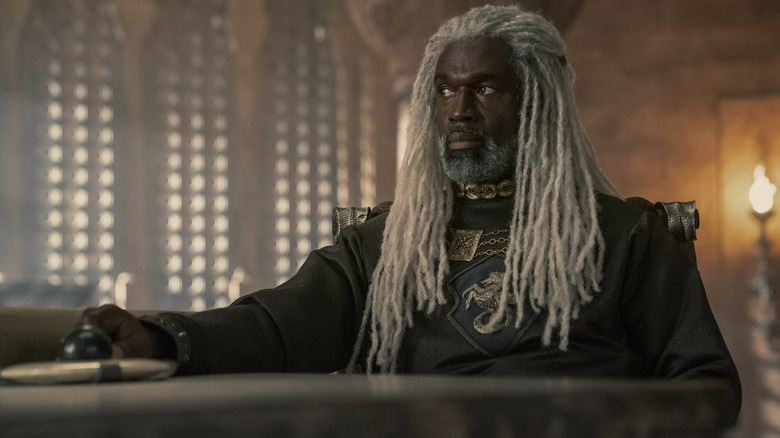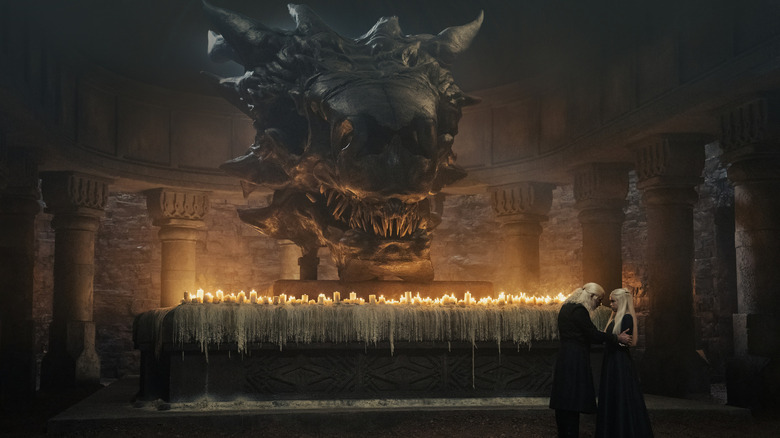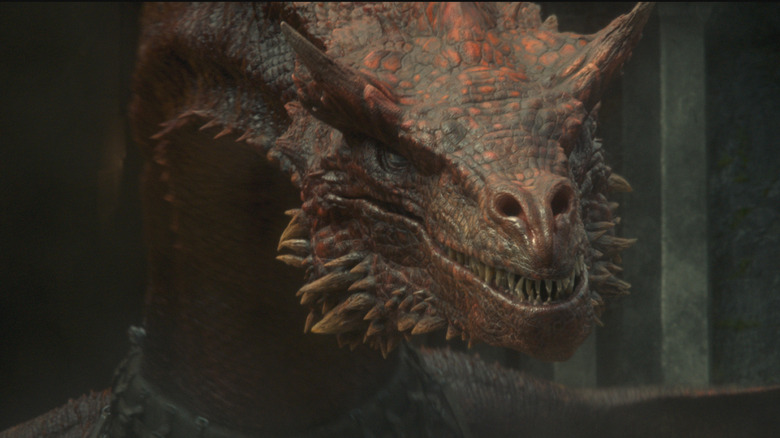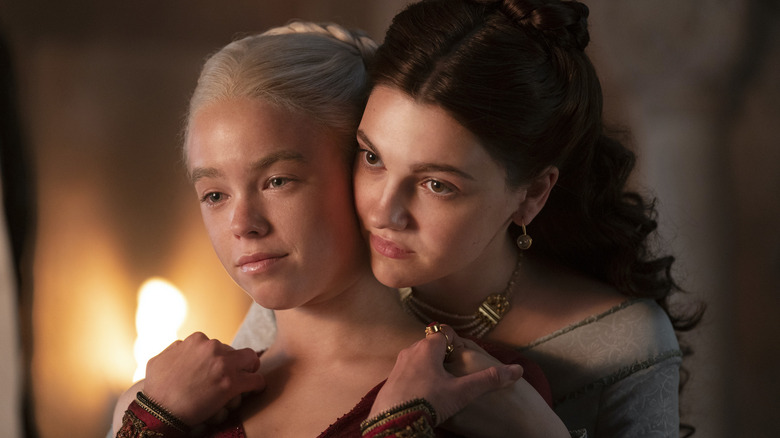House Of The Dragon Premieres With A Fiery Blast From The Past
"Game of Thrones" burned us bad. While it remains the most prominent talking point three years later, the controversial finale was just one fraction of the problem: HBO's hit series was plowing through rough patches way back in its fifth season. By the time it came to a close, lots of fans felt their passion for Westeros fizzle out completely. But even that wasn't enough to stop HBO from plotting a dozen spin-offs to take its place! Despite considering "Thrones" my favorite show for the better part of a decade, I really struggled with the idea of returning to Westeros; it wasn't so much residual anger or even low expectations — just an inability to feel the hype. So imagine my surprise when, seconds into "House of the Dragon," I felt that passion reignite.
In my defense, I'm a sucker for familiarity, and the premiere episode of "House of the Dragon" is packed with it. The familiar sound of Ramin Djawadi's compositions, the familiar names of the powerful families of Westeros, and a familiar vibe that harkens back to the earliest seasons of the original show. "Game of Thrones" was at its best when focused on political intrigue, scheming sycophants, and dramatic backstabbings. The later seasons got us so immersed in the grand spectacle of dragon fire and bastard battles that we forgot what this show was all about — talking!
That's not to say that there isn't a war brewing on the horizon, though. When the series opens, Westeros is enjoying a long period of peace — but wasn't that also true of the realm when we first entered the world with "Thrones"? As an excerpt from George R. R. Martin's "Fire and Blood" so clearly lays out, "The seeds of war are oft planted during times of peace."
Welcome back to Westeros
"House of the Dragon" doesn't roar to a start the way you might have expected from a show with "dragon" in the title. There's plenty of fire and blood to go around in "The Heirs of The Dragon," but it's very telling that when we begin, it's with a history lesson. Narrated by an older Rhaenyra Targaryen (a role shared by Milly Alcock and Emma D'Arcy), the series sets the table for conflict: before his death, the old King Jaehaerys (Michael Carter) called a council of 1000 lords to help determine his heir. With no trueborn sons left alive, the question of his succession wasn't straightforward — so they chose between his eldest descendant, Rhaenys (Eve Best), and her cousin, his eldest male descendant, Viserys (Paddy Considine). And of course, the lords of Westeros chose the man.
If the hope was to prevent the Targaryens from destroying themselves from within, then maybe Jaehaerys isn't as wise as everyone says — because based on the ominous voice of Rhaenyra, this is just the beginning. In choosing her father as the king's successor, the realm set a precedent that the line of succession is continued through a male heir. An unfortunate reality for her several years later, when she is still King Viserys' only child. But lucky for the line of succession, a baby is on the way: Viserys wife, Aemma (Sian Brooke), is pregnant with what he is 100% sure will be his son and true heir to the throne. And how does he know that? He saw it in a dream.
This yet-unborn child is quite a disruptor overall: he's inspired Viserys to throw a grand tourney in the capital, inviting all the great lords and ladies of the realm. He's also making Rhaenyra (Alcock) incredibly anxious about her future and he's having a similarly dramatic impact on the current heir to the throne, Viserys' younger brother, Daemon (a scene-stealing Matt Smith).
Enter the Rogue Prince
Poor Matt Smith is always a prince, never a king. As Daemon, he's basically reprising his role from the first two seasons of "The Crown" as a sulking man with great ambition, terrible people skills, and a powerful woman who he must eventually bow down to. When we first meet Daemon, he's still the heir to the Iron Throne, but the world won't let him forget that it's a temporary title. All the king needs to do is produce a son, then his brother will be forever replaced — and pretty much everyone wants that to happen because Daemon is all the things that make people wary of Targaryens: reckless, violent, and hungry for power.
The entertaining gem that he is, Daemon doesn't hold back when it comes to proving all those rumors true. Thanks to him, we don't make it 20 minutes into the episode without seeing several dismemberments, including all the "Game of Thrones" classics: Heads! Hands! And balls! All of this is courtesy of his cult — ahem, I mean, his City Watch recruits — who Daemon adorns with gold cloaks, a la the crown's money. But before all of that, Daemon pays a visit to his beloved niece, Rhaenyra, while sitting on the Iron Throne. (Some light treason to start the day is very healthy for the ego.)
The forgotten heirs
These two share a special bond: both are destined to be passed over for the son that Viserys so desperately wants. While Daemon's flaw is being a violent rogue, Rhaenyra is unsuitable to rule simply because she's a woman. It's a fact that she's been reminded of every day of her life, but she's done her best to take it in stride. While Rhaenyra would rather ride into battle as a knight and claim glory for herself, her mother reminds her that the birthing bed will be her battlefield, and her best friend Alicent Hightower (Emily Carey) encourages her to study her histories to please their Septa. It's not the life that she wants, but one she has no choice but to accept. Which includes the uniquely humiliating task of being her father's cupbearer. It's supposed to be a place of honor — pouring wine for the great lords while listening in on their council meetings — but listening to them talk about her younger brother who will claim the throne can't be a great feeling.
So there's an understanding between Daemon and Rhaenyra and honestly, there might be a little more there too. Were this any other family, their throne room moment might just be a sweet exchange between an uncle and his niece — alas, these are Targaryens and incest is the name of their game. I mean, come on — gifting her a necklace and putting it on her from behind? That's the universal TV sign for flirting! Ew.
The doomed women of Westeros
For the most part, we are reintroduced to the world of Westeros through the eyes of its women. This is a world built for men and rarely are they allowed to forget that. Rhaenyra and Rhaenys are our prime examples, as two women passed over for a throne that (by the established laws of succession) was rightfully theirs to inherit. But on the bleaker end of things are other women, stripped of choices and manipulated at every turn.
Alicent Hightower is a shining example: the girl is a bundle of nerves, and we quickly learn why. Her father is Otto Hightower (Rhys Ifans), a second son with great ambition and a direct line to the easily manipulated king. One second he's giving his daughter a hug, and the next he's telling her to wear her dead mother's dress to go seduce the king.
And then there's Aemma Targaryen, who doesn't even survive the premiere thanks to a decision made by her husband. A combination of an incestuous family tree and medieval medical practices makes for a traumatizing birthing sequence at the episode's climax: while Viserys throws a party downstairs, his wife toils away on the birthing bed. The episode is littered with references to what a difficult pregnancy she's endured, not to mention all the hints that this isn't an anomaly. She reveals that she lost a baby in the cradle, and endured two stillbirths and two miscarriages. This time around the baby is breached and the Maesters are at a loss, so they turn to the king to make a decision: they can cut her open to remove the child alive, or "leave it to the Gods."
Viserys makes an "impossible" choice. But imagine that — having a choice. Aemma certainly doesn't: no one warns her of what's to come or checks in with her preference, the men simply shuffle off to a corner to decide. When they drag her down to cut her open, it is reminiscent of the tourney happening outside, where the bloody corpses are dragged off the battlefield. Not even royal blood could save her from being treated so callously; this is a world that disposes of women like they're nothing.
Battle lines are drawn
With both the queen and the king's much-anticipated heir off the table, the sycophants come out to play. This episode is 50% small council meetings and it's incredible. There are seven council members to remember, including the oft absent Daemon and very conniving Otto, but most importantly, this is where we often see Corlys Velaryon (Steve Toussaint) aka the Sea Snake, a rich, seafaring badass. He's very wise, which we can assume because he doesn't drink at council meetings to keep his wits about him. He's also married to Princess Rhaenys, and they like to exchange these meaningful side glances which communicate two important facts: 1) they are very in love, and 2) they hate everyone in the world except each other (and their kids).
While Lord Corlys initially supports Daemon's claim to the throne, he later realizes that his wife has a pretty valid claim too and quickly swaps sides. Meanwhile, Otto Hightower votes in favor of feminism — but not in favor of Rhaenys. He suggests that Rhaenyra should be named the new heir. While some of the lords balk at the idea of bowing to a woman, others are desperate to see Daemon replaced. And Viserys? He's pissed off that succession is being discussed while he's still in mourning.
A new heir to the Iron Throne
It might have ended there, with Daemon remaining the heir for the foreseeable future, but the Rogue Prince makes a grave error. After buying out a pleasure house for his Gold Cloaks, Daemon makes a grand speech where he refers to his dead nephew as "The Heir for a Day." In case you missed the part of the episode where they glare daggers at one another from across the room or the part where Daemon humiliates his eldest son, Otto Hightower and Daemon Targaryen are not friends. They hate each other very much. So of course Otto passes along the details of this dumb speech to the king, who is infuriated. Making matters a million times worse, when confronted in the throne room, Daemon calls Viserys weak.
Let's be honest, Viserys seems nice enough, but Daemon is obviously right. Minus the rare occasions where he loses his cool, Viserys is too jolly to take seriously. He's easily manipulated by the likes of Otto and his other council members. But Daemon should've known better than to say that aloud. So Viserys makes a decision half-fueled by spite, but also his understanding that Daemon isn't fit to rule: he names Rhaenyra his heir. He also lets her in on a little family secret — that Aegon the Conqueror came to Westeros because he had a dream about the long night. He knew that the White Walkers would rise again, but he didn't know when.
But that's a problem for 200 years from now. As for now, a woman is set to inherit the Iron Throne. I'm sure that will go well. Stop me if you've heard this one before but legend has it that when you play the game of thrones, you win, or you die. We've met the players, and this marks the official start of the game.
Stray thoughts
-
Such a significant portion of this episode is dedicated to asking a single question: what the hell do dragons smell like? Every time Rhaenyra walks into a room, people comment that they can smell dragonback on her. Also, when Daemon is introducing Caraxes to his new girlfriend, he's getting a full blast of dragon breath. So what's that like? Smoke? Sulfur? Brimstone? Burnt flesh? I think each episode should include more hints that slowly unravel the mystery of dragon smells.
-
The first utterance of Dracarys is neither fiery nor triumphant. It's basically a broken whisper. Setting the tone for something, "House of the Dragon"?
-
Please enjoy an actual excerpt from my notes: "SER COLE SER COLE SER COLE (he's Dornish)." So far, all he's done is make eyes at the Princess and knock Daemon into the dirt, but surely that's enough to make Ser Cole a series MVP?
-
They keep referencing Maegor the Cruel, whose name really says it all, but I hope they take the time to give us more history lessons on Targaryen ancestors. Unless they're saving him for future seasons. Wouldn't want to accidentally give away another ending, I guess.
-
In "Game of Thrones," the Targaryens were essentially immune to fire. This was never true in the books, but I wonder which logic the prequel will uphold. If they try to burn Viserys' cut, will it work? Or is he trapped in a puss-filled purgatory?
-
It's really fun to see ancestors of the characters we knew in Thrones. Not all Starks are as pretty as Robb, but evidently, all Baratheons are brash and disrespectful.
-
Did anyone else ascend during the tribute to Daenerys? Just me? That's fine. You have to admit, it was a pretty nice touch: not only does it commemorate the Mother of Dragons, it's a sharp reminder of when and where we are. 172 years before the Westeros we know, before the Targaryens were nothing more than a dwindling family with a single successor (or two, depending on what Jon's up to). Right now, they are at the height of their powers — and the only threat to their reign is themselves.
Who is winning the Game of Thrones?
The world of Westeros may be continuing under a different title, but we are still playing a game of thrones. So let's take a moment to reflect on the episode's most prominent players:
WINNER: Rhaenyra Targaryen - After spending her entire life assuming she had no claim to the Iron Throne, Rhaenyra is now next in line to rule. That's a pretty significant step up! There's plenty that could go wrong of course: Daemon doesn't seem like the kind of guy to slink away without complaint ... I doubt Otto Hightower recommended her as heir out of the goodness of his heart ... And the lords of Westeros clearly resent bowing to a woman, but for now, she is officially heir to the throne.
LOSER: Daemon Targaryen - Rider of Caraxes, wielder of Dark Sister, and destined to be replaced. Daemon is so distinctly disliked that Viserys (and his council) were willing to break tradition and name a women heir, rather than have him inherit the throne. In a world of medieval sexism, that's pretty embarrassing.
WINNER: Otto Hightower - Hand of the King is a powerful position if you wield it well. Otto not only has a direct line to the king's ear but his unquestioned faith. He managed to get Daemon out of his hair (for now), so what else can he pull off?
LOSER: Rhaenys Valaryon - The Queen Who Never Was, Rhaenys is constantly disrespected throughout the episode. It might feel like progress to have a woman named heir to the throne but by the logic of Rhaenyra being crowned, hasn't Rhaenys just been passed over once again?
STILL IN THE GAME: Viserys Targaryen - Being cut by the iron throne feels like a very bad sign. Also, on a more practical note, it left him with a pretty nasty cut. And more importantly, Daemon has a f***ing point. Viserys is weak and everyone else seems to know it. Otto Hightower is manipulating him with ease, and everyone else feels comfortable enough to try their hand at swaying him too. Whether he realizes it or not, that's very bad for the realm. And all of that is on top of losing his heir and wife to childbirth. He's still in the game because technically the crown is on his head, but how much longer will that be true?
STILL IN THE GAME: Alicent Hightower – Now here's an interesting one. Alicent is pretty quiet in the premiere episode, especially when standing beside characters with much flashier ambition (see: Daemon, Rhaenyra, Otto). But make no mistake, she's a major player in this game. When Rhanyra (somewhat bitterly) hopes her father will get the son he always wanted, Alicent seems stunned: "You aren't worried about your position?" Alicent seems perpetually anxious about her own standing, which isn't difficult to understand with a father like Otto Hightower. Donning her mother's dress to seek a private audience with the king certainly isn't her idea, but could very well have an impact on her position at court.
